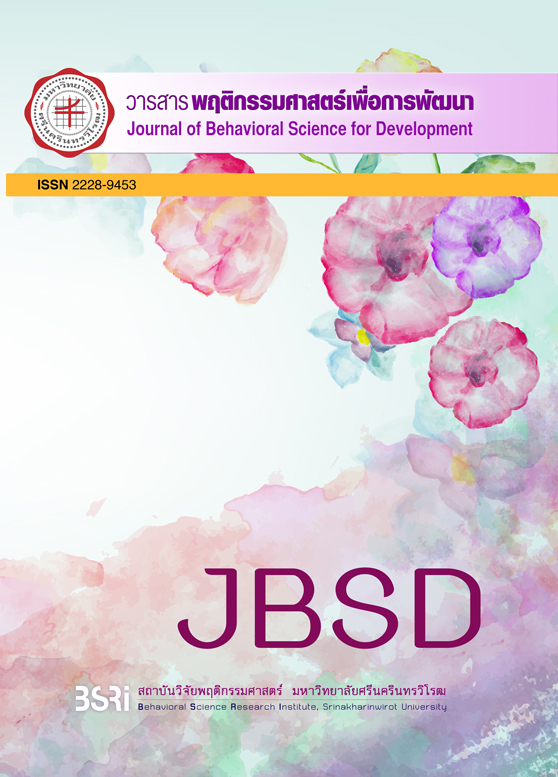The Influence of Kalayanamitt Yonisomanasikan Belief in Kusonkammabot 10 and Psychological Factor to Desitable Student Behavior อิทธิพลกัลยาณมิตร โยนิโสมนสิการ ความเชื่อในกุศลกรรมบถ 10 และ ปัจจัยทางจิตที่มีต่อพฤติกรรมนักเรียนที่พึงประสงค์
Keywords:
kalayanamitt, yonisomanasikan, belief in kusonkammabot 10, psychological factors, The desirable student behaviorAbstract
The purpose of this study was to 1) Design the linear structural relations model among antecedents of Kalayanamitt ,Yonisomanasikan, Belief in kusonkammabot 10, Mental health and in The future self-control characteristic which The desirable student behavior. 2) Study influence of Buddhism factors and Psychological factors characteristic which The desirable student behavior. Samples were Mathayom 3 students academic year 2010 sample size was 624 the number of Buddhists who have come from stratified random sampling of 11 schools under the Bangkok. The results showed that Model of the structural linear harmony with empirical data, after adjustment models (Chi-Square = 683.89, df = 315, Relative Chi-Square = 2.17, GFI = 0.93, AGFI = 0.91, SRMR = 0.04, RMSEA = 0.03. , CFI = 0.99 and CN = 343.81) was found significant effect sizes in the model. 1) The desirable student behavior have direct effects of Yonisomanasikan variable maximum ( = 0.61, p< .001) 2) The desirable student behavior have indirect effects of Kalayanamitt variables maximum ( = 0.91, p< .001) with indirect effects through three routes for examples Yonisomanasikan ,Belief in Kusonkammabot 10 and The future self-control.
Key Word: kalayanamitt, yonisomanasikan, belief in kusonkammabot 10, psychological factors, The desirable student behavior
บทคัดย่อ
การวิจัยครั้งนี้มีวัตถุประสงค์เพื่อ 1) สร้างโมเดลความสัมพันธ์โครงสร้างเชิงเส้นของปัจจัยสาเหตุของกัลยาณมิตร โยนิโสมนสิการ ความเชื่อในกุศลกรรมบถ 10 สุขภาพจิตและลักษณะมุ่งอนาคต-ควบคุมตน ต่อพฤติกรรมนักเรียนที่พึงประสงค์ 2) ศึกษาอิทธิพลของปัจจัยด้านพุทธศาสนา ปัจจัยทางด้านจิตลักษณะ ที่ส่งผลต่อพฤติกรรมนักเรียนที่พึงประสงค์ กลุ่มตัวอย่าง ได้แก่ นักเรียนชั้นมัธยมศึกษาปีที่ 3 ประจำปีการศึกษา 2553 ที่นับถือศาสนาพุทธจำนวน 624 คน ซึ่งได้มาจากการสุ่มแบบแบ่งชั้นจาก 11 โรงเรียนในสังกัดกรุงเทพมหานคร ผลการวิจัยพบว่า โมเดลความสัมพันธ์โครงสร้างเชิงเส้นมีความกลมกลืนกับข้อมูลเชิงประจักษ์หลังจากการปรับโมเดล (Chi-Square = 683.89, df = 315, Relative Chi-Square = 2.17, GFI = 0.93, AGFI = 0.91, SRMR = 0.04, RMSEA = 0.03, CFI = 0.99 และ CN = 343.81) โดยพบขนาดอิทธิพลที่สำคัญในโมเดลดังนี้ 1) พฤติกรรมนักเรียนที่พึงประสงค์ ได้รับอิทธิพลทางตรงจากตัวแปรโยนิโสมนสิการสูงที่สุด ( = 0.61, p< .001) 2) พฤติกรรมนักเรียนที่พึงประสงค์ ได้รับอิทธิพลทางอ้อมจากตัวแปรกัลยาณมิตรสูงที่สุด โดยมีอิทธิพลทางอ้อมผ่าน 3 เส้นทาง คือ โยนิโสมนสิการ ความเชื่อในกุศลกรรมบถ 10 และลักษณะมุ่งอนาคต-ควบคุมตน
คำสำคัญ : กัลยาณมิตร โยนิโสมนสิการ กุศลกรรมบถ 10 ปัจจัยทางจิต พฤติกรรมนักเรียนที่พึงประสงค์



